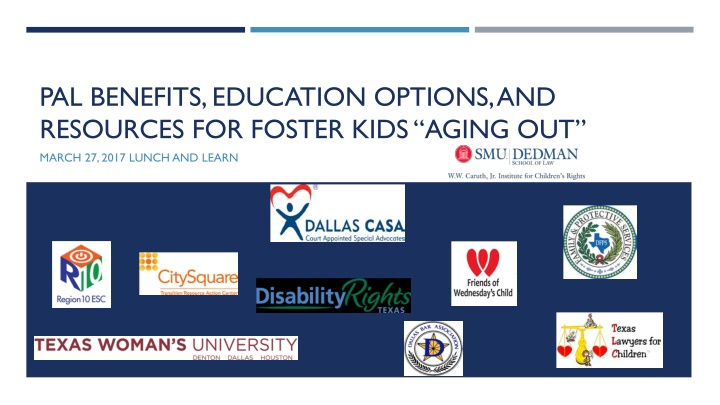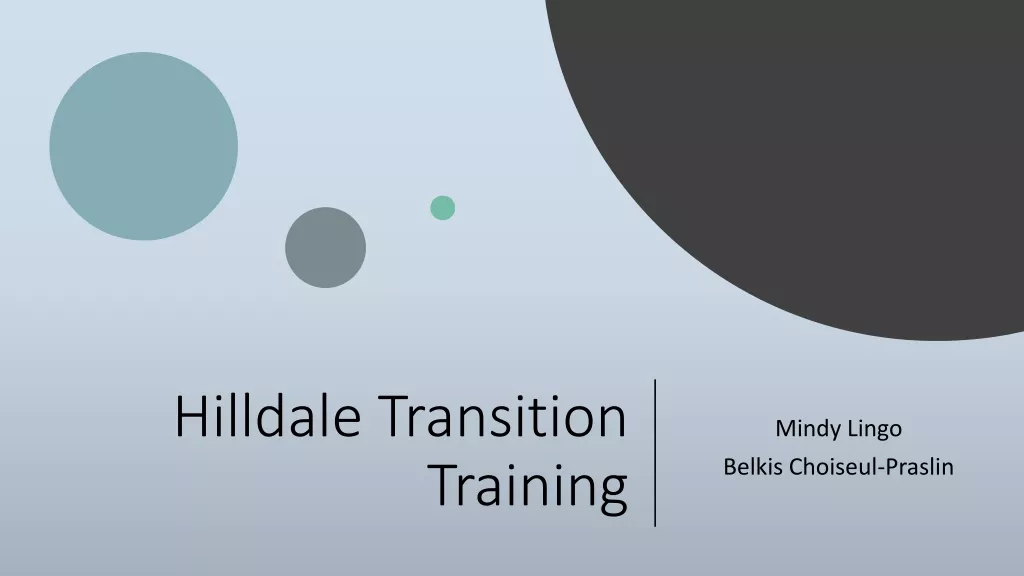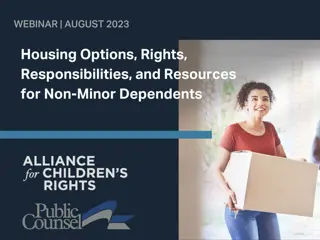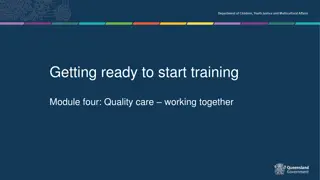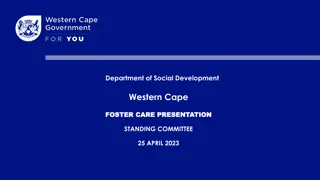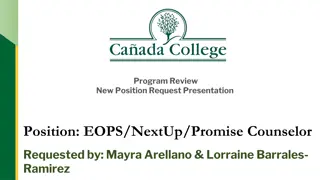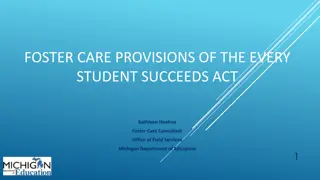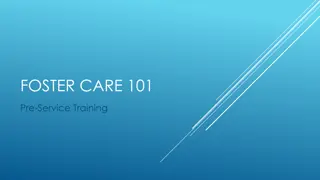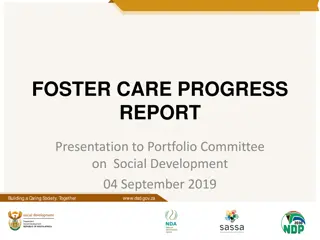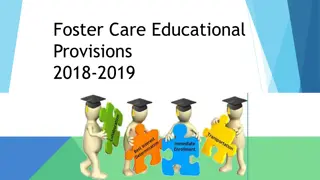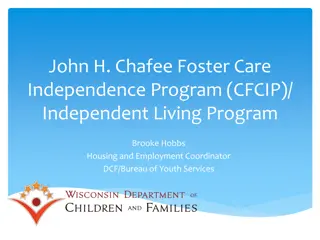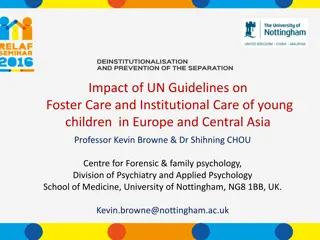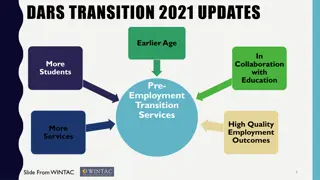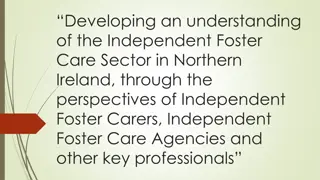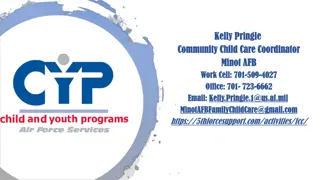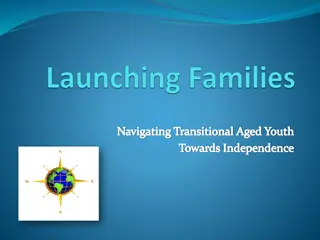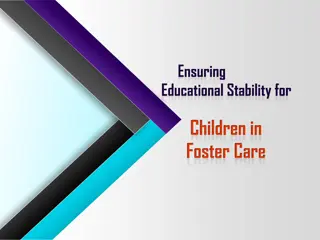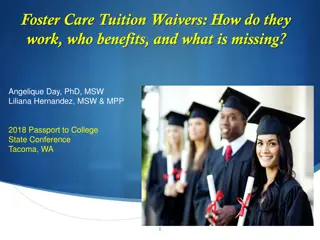Foster Care Transition Programs and Support
Discover valuable resources and services available for foster kids aging out of the system. Learn about educational options, legal support, and assistance programs tailored to those transitioning into adulthood from foster care.
Download Presentation

Please find below an Image/Link to download the presentation.
The content on the website is provided AS IS for your information and personal use only. It may not be sold, licensed, or shared on other websites without obtaining consent from the author.If you encounter any issues during the download, it is possible that the publisher has removed the file from their server.
You are allowed to download the files provided on this website for personal or commercial use, subject to the condition that they are used lawfully. All files are the property of their respective owners.
The content on the website is provided AS IS for your information and personal use only. It may not be sold, licensed, or shared on other websites without obtaining consent from the author.
E N D
Presentation Transcript
PAL BENEFITS, EDUCATION OPTIONS, AND RESOURCES FOR FOSTER KIDS AGING OUT MARCH 27, 2017 LUNCH AND LEARN
THE LEGAL BACKDROP DIANE M. SUMOSKI, ESQ.
SERVICES FOR CHILDREN LIKELY TO REMAIN IN FOSTER CARE UNTIL 18 YEARS TEXAS FEDERAL Tex. Fam. Code 264.121 Defines the Preparation for Adult Living Program and Transitional Living Services Program directing the Department to achieve the goals of those programs Basic skills like shopping, opening bank acct. Services for obtaining GED or completing high school Job training and employment services Nutrition education College preparation services Chafee Foster Care Independence Act 1999 (42 U.S.C. 677 (2015)) Services ILI (teaching basic skills like cooking, opening bank acct.) Help to obtain high school diploma Vocational Training Job placement services Substance abuse prevention Preventive health activities Preparation for post-secondary training/education institutions Personal and emotional support
SERVICES/ASSISTANCE FOR FORMER FOSTER CHILDREN AGED 18-21 FEDERAL TEXAS Chafee Foster Care Independence Act 1999 Independent Living Services Mandate that a portion of Chafee funds be used for youth up to age 21 Up to 30% can be used for Housing assistance States have option to extend Medicaid eligibility to former foster youth to age 21 (now up to 26 due to ACA) 40 Tex. Admin. Code 700.1601 Chafee funds administered through the PAL program, which is primarily intended for young people: (1) at least 16 years old and likely to remain in foster care until at least age 18; and (2) younger than 21 years old and who have aged out. Youth who are 18 to 21 that have aged out of care are eligible for: $1,000 as Transitional Living Allowance; and $3,000 as Room and Board Assistance S.B. 51, 77thLeg. Extended Medicaid eligibility to former foster youth to age 21 (now up to 26 due to ACA)
EDUCATION BENEFITS TEXAS FEDERAL Tex. Admin. Code 700.1611 et seq. Chafee Educational and Training Vouchers (ETV) 2002 (42 U.S.C. 677(i)(4)(2015)) Up to $5K per year: the lesser of $5K or the total cost of attendance In 2002 Congress provided $60M for this program Available to youth who: Up to $5K per year to help pay for qualifying college or vocational education expenses are in foster care and are at least age 16; have aged out of foster care and have not turned age 21; States to provide 20% match were adopted from DFPS conservatorship after turning age 16 and have not turned age 21; or Available to youth otherwise available for services under state Chafee program or were adopted from Foster care after 16thbirthday. entered the Permanency Care Assistance (PCA) program from DFPS conservatorship after turning age 16 and have not turned age 21 If in program when turn 21, eligible to continue to 23 if enrolled and performing satisfactorily If in program when turn 21, eligible to continue to 23 if enrolled and performing satisfactorily ETV does not count when considering federal financial aid Generally, college/dual credit tuition and fees are waived for students who were in foster care (Tex. Educ. Code 54.366)
SPECIAL EDUCATION TEXAS FEDERAL The requirements of the Transition Plan are minimal, but it must include specific provisions, discussing: IEP must include a transition plan to move the student from school to post-school life including transition services. (34 C.F.R. 300.320(b)). (1) the cost of housing v. sources of income; (2) the youth s housing goals and psychological and emotional difficulties that might be associated with housing arrangements; IEP must help youth access services such as community experience, employment, adult living objectives, living skills, and vocational evaluation (34 C.F.R. 300.43) (3) emergency shelters, dormitories and other resources; IEP must identify post secondary programs to assist the youth (34 C.F.R. 300.102(a)(3)) (4) review of a common rental application; and (5) potential cosigners or references for applications (Tex. Fam. Code 264.121(i))
HEALTH CARE TEXAS In Texas, foster care children generally receive funding if they either aged out and were receiving Medicaid or if they re 18 to 20. (Youth may be eligible for other Medicaid programs.) Texas HHS does not provide Medicaid services to youth who aged out outside of Texas and moved here or who aged out in Texas and moved elsewhere The proposed American Health Care Act (AHCA) seems to have retained coverage for foster care youth up to age 26. The AHCA would phase out presumptive eligibility for other groups, but not those formerly in foster care. The changes amend 42 U.S.C. 1396r 1. See The Chronicle of Social Change, Foster Care Survives in House Healthcare Bill (quoting Zach Hunter, House Committee on Energy and Commerce). FEDERAL The Affordable Care Act requires states to extend Medicaid coverage to age 26 for all youth enrolled in Medicaid and foster care on their 18thbirthday (or enrolled in Medicaid after they aged out if over 18) (42 U.S.C. 1396a(2015)). Income irrelevant to eligibility Age out/not yet 26 immediate coverage Currently in care and age out covered State only required to extend coverage to youth who aged out in their own state
FOSTERING CONNECTIONS TO SUCCESS AND INCREASING ADOPTIONS ACT TEXAS Texas provides an Extended Foster Care program requiring the youth to sign a Voluntary Foster Care Agreement, whose terms will include monthly caseworkers visits and participation at review hearings. Rules for the Extended Foster Care program can be found atTAC 700.316 (general requirements) 40 T.A.C. 700.346 defines eligible [activities foster youth must be engaged in to continue to receive assistance (1)attending high school or secondary education, (2) actively participating in a program a program or activity that promotes, or removes barriers to, employment, (3) being employed for 80+ hours a month, or (4) being incapable of doing so due to medical condition More guidance can be found at CPS Handbook 1540 and 10400 FEDERAL States are allowed to receive funding to permit children to remain in foster care beyond age 18 expands definition of child 42 USC 675(8)(B)(2015). Foster care maintenance payments made to supervised setting Foster care maintenance payments made directly to youth
SSI BENEFITS FEDERAL Youth must be disabled; standards differ depending on age If under 18 must have a medically determinable physical or mental impairment; which results in marked and severe functional limitations; can be expected to result in death or to last for a continuous period of not less than 12 months TEXAS DFPS will identify youths that are 17 years old and potentially eligible for SSI benefits (CPS Handbook, 1585.2) If over 18 must be unable to engage in ay substantial gainful activity; by reason of medically determinable physical or mental impairment; that can be expected to result in death or to last for a continuous period of not less than 12 months DFPS issues a quarterly report to SSI coordinators and, if a youth s SSI application has not yet been submitted, an SSI coordinator gathers the relevant documents within 30 days and ensures that the application is properly submitted 42 U.S.C. 1382c(2015) Applications can be made to the SSA up to 90 days before federal foster care payments are expected to end. (Social Security Administration, POMS Policy Instruction No. SI TN 18, Effective Jan. 13, 2010)
NOW LETS SEE THE LAW IN ACTION! CARLA CLEETON, CITYSQUARE-TRAC, RESIDENTIAL SERVICES MANAGER HUD HOUSING PROGRAM REBECCA DANIEL, DFPS, PREPARATION FOR ADULT LIVING SUPERVISOR KATHLEEN BUSHE, CITYSQUARE-TRAC, CASEMANAGEMENT SUPERVISOR
